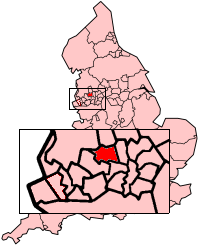
The 2016 Bolton Metropolitan Borough Council election took place on 5 May 2016 to elect members of Bolton Metropolitan Borough Council in Greater Manchester, England. [1] [2] This was on the same day as other local elections.

Greater Manchester is a metropolitan county in North West England, with a population of 2.8 million. It encompasses one of the largest metropolitan areas in the United Kingdom and comprises ten metropolitan boroughs: Bolton, Bury, Oldham, Rochdale, Stockport, Tameside, Trafford, Wigan, and the cities of Manchester and Salford. Greater Manchester was created on 1 April 1974 as a result of the Local Government Act 1972; and designated a functional city region on 1 April 2011.
Contents
- Election result
- Council Composition
- Ward results
- Astley Bridge ward
- Bradshaw ward
- Breightmet ward
- Bromley Cross ward
- Crompton ward
- Farnworth ward
- Great Lever ward
- Halliwell ward
- Harper Green ward
- Heaton and Lostock ward
- Horwich and Blackrod ward
- Horwich North East ward
- Hulton ward
- Kearsley ward
- Little Lever and Darcy Lever ward
- Rumworth ward
- Smithills ward
- Tonge with the Haulgh ward
- Westhoughton North and Chew Moor ward
- Westhoughton South ward
- References
20 seats were contested and the Labour Party won 12 seats, the Conservatives won 5 seats, UKIP won 2 seats and the Liberal Democrats won 1 seat. [3]
After the election, the total composition of the council was as follows:
- Labour 37
- Conservative 15
- UK Independence Party 5
- Liberal Democrats 3.
The Labour Party is a centre-left political party in the United Kingdom which has been described as an alliance of social democrats, democratic socialists and trade unionists. The party's platform emphasises greater state intervention, social justice and strengthening workers' rights.

The Conservative Party, officially the Conservative and Unionist Party, is a centre-right political party in the United Kingdom. Presently led by Theresa May, it has been the governing party since 2010. It presently has 314 Members of Parliament in the House of Commons, 249 members of the House of Lords, and 18 members of the European Parliament. It also has 31 Members of the Scottish Parliament, 12 members of the Welsh Assembly, eight members of the London Assembly and 9,008 local councillors. One of the major parties of UK politics, it has formed the government on 45 occasions, more than any other party.

The UK Independence Party is a hard Eurosceptic, right-wing political party in the United Kingdom. It currently has one representative in the House of Lords and seven Members of the European Parliament (MEPs). It has four Assembly Members (AMs) in the National Assembly for Wales and one member in the London Assembly. The party reached its greatest level of success in the mid-2010s, when it gained two Members of Parliament and was the largest UK party in the European Parliament.


